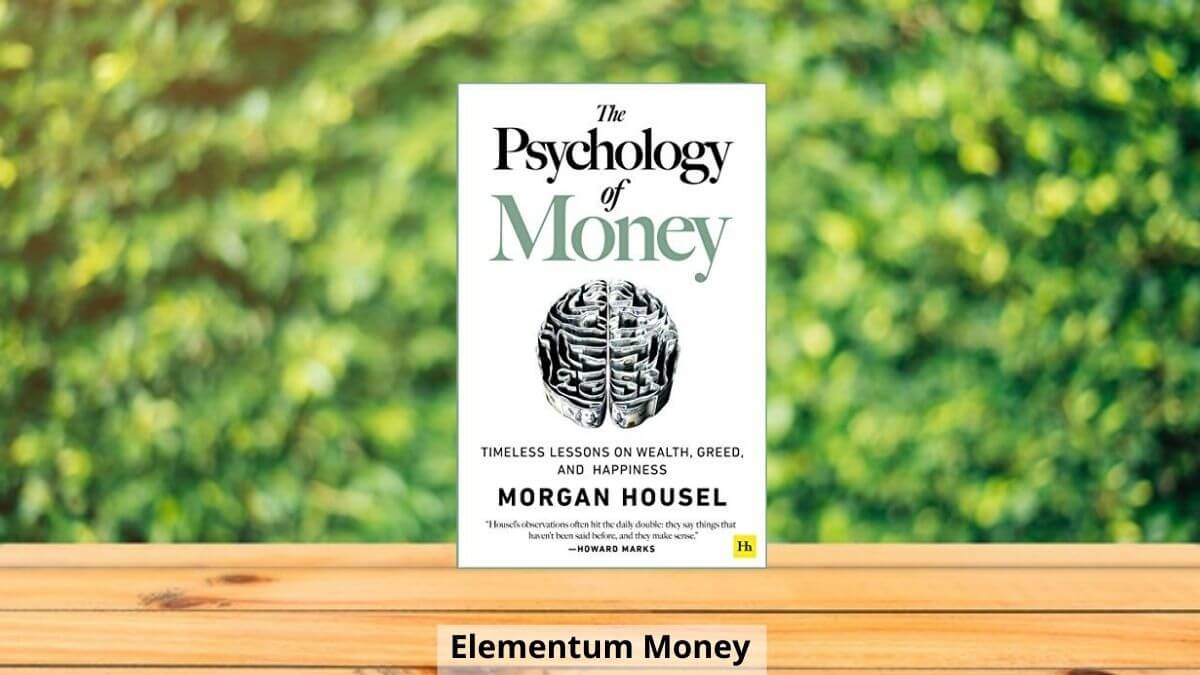One of the things which attracted me to the idea of Personal Finance was the idea that money is not just about numbers. Money is a true reflection of what we are. The better we know and understand ourselves, the better we are able to manage our money in a way that means the most for us. One of my first introductions to that idea was a talk I was fortunate to attend, given by Carl Richards of the Behavior Gap fame. But, as I have read more and more in this space, I realised there are more stalwarts adding vital inputs in this terrain. The most recent I got to lay my hands on made the topic at hand very clear which is The Psychology of Money by Morgan Housel.
About Morgan Housel
The best thing about still being nascent in this field is that I still get to discover a lot of gems. Morgan Housel is one such writer who I became aware of only a few months back. First through a wonderful podcast interview where he spoke about his writing process (which of course intrigued me in the hope of picking up some tips). Some time later, as yet another perk of the job I got to virtually attend a talk by him where he talked us through what investors should do in this crisis.
Morgan Housel started out with a dream of becoming an investment banker but realised it wasn’t a great fit with his personal aspirations for a work life balance. He moved on to become a columnist for Wall Street Journal, moving on to Motley Fool for a longer stint. In 2016, he became partner at Collaborative Fund which is a venture capitalist fund for companies that intend to make the world a better place. As for his writing, it’s clear, lucid and does a brilliant job of marrying the emotion and numbers behind money.
About the book
As expected the title of the book is as clear as can be. You pretty much know what to expect of a book called The Psychology of Money.
The book is structured well into twenty short chapters with the last two more of a summary and a look into his personal investments. All, and I repeat all, chapters are worth reading carefully. So, even when he talks about a much-emphasises point like compounding he draws the readers attention in such a way that the lesson is bound to get imprinted in your head.
For anyone who has read earlier posts, you might know what to expect. I shall go ahead and talk about the five points that made the maximum impact on me.
Five main takeaways
This was one book where I struggled to eliminate things to talk about. But, the idea remains to build up this post more like a teaser that urges you to pick up the book.
1. Two sides to a coin
To any event, there are two components. One, our controllable actions and two, that intangible thing which really tips the scales. However, the outcome defines how we look at what happened. Either we look at it as good luck or we look at it as risk coming true. Unfortunately, in many circumstances we forget to factor in these elements. Be it when we look at a person we look up to or someone in bad times.
In personal finance, too, it is important to remember the role these two play. With any investment, exponential returns means luck had a role to play. While even with a seemingly good-looking proposal on paper, things can go horribly wrong. Weigh the two elements while you make your decisions. Also, give them enough credit when things go either right or wrong.
One of the line Housel often urges the reader to remember is one penned by Professor Scott Galloway to say – “Nothing is as good or as bad as it seems”. That ties in well with another things I have realised over the years. Things are not black or white and we should learn to appreciate the greys.
But it’s really the below line which neatly ties up what Housel wants to convey in the entire chapter:
The line between “inspiringly bold” and “foolishly reckless” can be a millimeter thick and only visible with hindsight.
– The Psychology of Money, Morgan Housel
2. 50{76b947d7ef5b3424fa3b69da76ad2c33c34408872c6cc7893e56cc055d3cd886} hit rate is good enough
Life is a long string of decisions and actions. Some will go right and some will not. The reason why most of us find it difficult to wrap our head around it is the fact that when we look at success stories, we only get to know the parts that worked. We simply see the tip of the ice berg that pushed it’s way up to the surface and not the foundation of failures.
It is only when we think of failure in action-halting grave terms that we are on the wrong end of the bargain. This is true in almost every aspect of life – be it career, relationships or money.
When it comes to Personal Finance, for me the personification of this idea is when I look at decades-old stock portfolios. Those investors have a story behind almost every stock that they are invested in. Most portfolios will have many duds, some average performers and a minority of holdings which are responsible for the lion’s share of the portfolio returns.
Hold on to the basics and keep consistently taking the small required actions. Do not get swayed by the idea of today’s hot picks being screamed from all possible media outlets and your friendly neighbourhood advisor. If you get even half your bets right, in the long run you will be sorted.
When you accept that tails drive everything in business, investing, and finance you realize that it’s normal for lots of things to go wrong, break, fail, and fall.
– The Psychology of Money, Morgan Housel
3. Difference between rich and wealthy
This to me is a vital point that most people neglect to realise. One of my colleagues often posts those stupid, stereotypical millionaire quotes. All of them have this suave man (yes, always a man) in the backdrop of a fancy car or exotic locations. Essentially, all the typical trappings that we associate with “rich”.
But, as Housel points out rich is about showing material assets to the world. On the other hand, wealthy is about preserving assets to provide flexibility and independence to yourself. Since we see only the riches we end up aspiring to that assuming that wealth goes hand-in-hand. But, we just need to remember some of the shocking celebrity bankruptcies to etch this vital difference in our minds.
The world is filled with people who look modest but are actually wealthy and people who look rich who live at the razor’s edge of insolvency. Keep this in mind when quickly judging others’ success and setting your own goals.
– The Psychology of Money, Morgan Housel
4. People change and so will you
This for me was one of the eureka moments from the book. When it comes to finance, I have often believed that goal based investing is key. Anyone who doesn’t get that is not doing it right.
As often happens, this book made something clear for me. There is no right answer. We can happily start with a point of a long term goal. But, to assume everything will go in the straight line as imagined is naïve. Here, I am not simply talking about returns of the investment as imagined. Point is, your goal may not remain the same or it evolves as your life chugs along.
He mentions an impressive bias – The End of History Illusion. This is the tendency of us humans to acknowledge that changes have happened in the past while assuming the future will remain static. For instance, I am no stranger to changing my mind in something as important as career. Swinging from wanting to be an archaeologist to a marketer and now an investment counsellor, I for one, know life and well my passion is not something static. I will continue changing and (hopefully) evolving as a result of my environment and experiences.
One way around this, as suggested by Housel is to use moderation in assumptions. Do not assume that you will be happy with a baseline salary. Do not assume that you will achieve financial independence by scraping through for years so that you earn nothing for the remaining years. Plan in moderation and don’t go overboard one way or the other.
An underpinning of psychology is that people are poor forecasters of their future selves.
– The Psychology of Money, Morgan Housel
5. Why do bubbles happen?
Considering Housel is a big advocate of possibilities, he starts out on this path with the idea that this is one of the possible explanations.
Almost all proponents of value investing or almost any investing talk about the right price of an asset. This can be arrived through discounted cash flows or the other umpteen methods given by different proponents. However, as Housel puts it, there is no one right price. Different investors with varied objectives and time horizons will value a particular asset very differently.
While I highly recommend reading the original description of this idea in the book, this one quote sums it up quite well.
Bubbles form when the momentum of short-term returns attracts enough money that the makeup of investors shifts from mostly long term to mostly short term.
– The Psychology of Money, Morgan Housel
So, as an example, there is a huge chunk of Reliance Industries investors who have been holding on to the stock since its’ IPO in the late 1980s. In fact, I have met a number of them. Now, with all these investments by players of the like of Facebook, Google and Qualcomm the stock got a boost and traders rushed in. Now, even people with long term horizon start looking at how much it could zoom in the long run. Note, I am not saying Reliance Industries stock is a bubble but it sure has acted like one with the speed at which it has raced in the last few months.
The lesson to note? Remember the game that you are playing when it comes to investing. Are you saving up looking at the long-term growth of the company or are you looking to make a quick buck? Then do those analyst top picks with price target really matter? Keep an eye on the prize and hold your ground to retain some modicum of rationality in the sensationalism built all around.
There are enough and more books to give a basic understanding of the products or the numbers that will help make you a good investor. Very few do as good a job as this one in exploring the behavioural aspect to it. Do yourself a favour and read it. If possible make notes on the lessons he talks about and pin it up where you can see it before making almost any money decision. This book then will be one good investment.





Leave a Reply